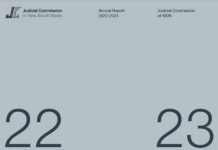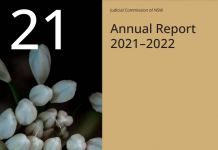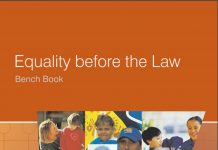The following changes have been incorporated in this Update:
Section 4 — People with a particular religious affiliation
Reference is made at 4.2.3.2 Holy books and scriptures, to a discussion of the different textual interpretations of the Qur’an from an article by B Rauf, “After R v Bayda; R v Namoa (No 8)” (2019) 31(9) JOB 81. Elzahed v Kaban [2019] NSWSC 670 has been added at 4.2.3.5 Relevant practices as an example of disrespectful behaviour in court and the elements of the offence under s 200A District Court Act 1973. A new paragraph 4.2.7 Religious vilification has been added. This discusses the lack of prohibition on religious discrimination and notes the incidence of religious vilification associated with particular events. Details of where a person may notify of particular religious vilification are also given.
Section 8 — Lesbians, gay men and bisexuals
Information has been updated at 8.1 Some statistics following new and updated research materials, such as the NSW Legislative Council’s Standing Committee on social issues final report into gay and transgender hate crimes in May 2021 and the LGBTIQ+ Health Australia’s 2021 update titled “Snapshot of mental health and suicide prevention statistics for LGBTIQ+ people”. This includes new information on the issues faced by LGBTIQ people in regional, rural and remote communities. Masson v Parsons (2019) 266 CLR 554 and ND v BM [2003] FamCA 469, both dealing with the legal recognition of donor parents, have been added at 8.3.2 Same sex relationships. A new report by ANROWS, “Crossing the line: lived experience of sexual violence among trans women of colour from culturally and linguistically diverse backgrounds in Australia. Key findings and future directions” has been added at 8.7 Further reading.
Section 11 — Older people
It is noted at 11.2 Elder abuse that under s 15A of the Ageing and Disability Commissioner Act 2019, which commenced on 23 June 2021, it is an offence for a person to take detrimental action against an employee or contractor who assists the Ageing and Disability Commissioner with a report about abuse, neglect or exploitation of an adult with a disability or an older adult. 11.2.1 Abuse and neglect in residential care has been updated following the 2019-20 Report on the operation of the Aged Care Act 1997. New commentary on the Serious Incident Response Scheme (SIRS), which commenced 1 July 2021, has been included. Under the 2021 amendments to the Aged Care Act 1997 (Cth) which introduced the SIRS, the definition of a “reportable incident” was inserted, which is broader than the previous “reportable assault”. New reporting requirements as part of SIRS mean that residential aged care providers will be required to report and manage all serious incidents which impact on the safety and well-being of consumers, with the range of serious incidents that are reportable under SIRS being broader than those under previous compulsory reporting requirements. The statistics in relation to sexual abuse in residential care have also been updated.
At 11.2.1 Succession/financial/capacity abuse, the following articles have been added regarding family accommodation arrangements: P Lane, “Reform in elder law: granny flats” (2018) 92 ALJ 413; L Kyle, “Out of the shadows — a discussion on law reform for the prevention of financial abuse of older people” (2013) 7 Elder Law Review, Article 4; T Somes, “Identifying vulnerability: the argument for law reform for failed family accommodation arrangement”, (2020) 12 Elder Law Review, Article 7.
It is noted at 11.3.4 Older persons as perpetrators of crime that Australia does not have specialist aged care providers for people who have committed serious criminal offences, and few private providers are keen to take them on. That leaves many older prisoners, particularly older sex offenders, in prison long after their earliest release date. This in turn leaves prison hospitals to operate as proxy aged care providers. The 2020 national strategic plan developed by the Law Council of Australia (drawing upon the expertise of the Constituent Bodies, the Law Council’s rural, regional and remote (RRR) Committee, and the Justice Project Report) regarding rural, regional and remote communities notes that inadequate technological infrastructure in courts in RRR areas is a key contributing factor to RRR access to justice problems that must be addressed. Commentary on this issue has been added at 11.4.1 Barriers to justice.
Choi v NSW Ombudsman (2021) 104 NSWLR 505 has been added at 11.5.1.2 Older people and the NSW Guardian ad Litem panel. This case discusses the valid appointment of a guardian ad litem under s 45(4) and (6) of the Civil and Administrative Tribunal Act 2013.










